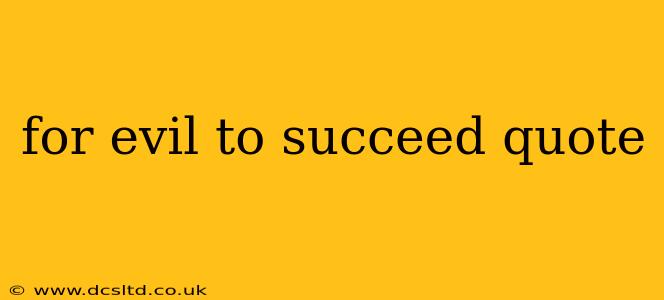The chilling quote, "For evil to succeed, only good people need do nothing," attributed to various sources, including Edmund Burke, speaks volumes about the responsibility of individuals in the face of injustice. It's not a passive observation; it's a call to action, highlighting the crucial role of active participation in upholding morality and justice. This isn't merely about grand gestures; it encompasses the everyday choices we make and the impact of our inaction. This article will delve into the meaning of this powerful statement, examining its implications and exploring the various ways good people can actively combat evil.
What Does "For Evil to Succeed, Only Good People Need Do Nothing" Really Mean?
This quote underscores the critical point that evil doesn't necessarily require the active participation of malicious individuals alone. It thrives in apathy, in the silence of those who witness injustice but choose not to intervene. The quote doesn't absolve those who actively perpetrate evil, but it focuses intensely on the shared responsibility of those who could have prevented it. It emphasizes the moral obligation to stand up against wrongdoing, regardless of the personal cost or perceived inconvenience. The weight of this quote lies in its assertion that inaction is, in itself, a form of complicity.
Why is Inaction So Dangerous?
The danger of inaction is multifaceted:
- Normalization of Evil: When good people do nothing, they inadvertently normalize harmful behaviors and attitudes. Silence becomes acceptance, allowing injustice to flourish unchecked.
- Emboldening Perpetrators: The absence of resistance emboldens those who commit evil acts, encouraging them to continue and escalate their actions. They see a lack of opposition as a sign of weakness or indifference.
- Erosion of Moral Standards: A society where good people remain silent in the face of evil slowly erodes its moral compass. This can lead to a decline in social responsibility and an increase in societal dysfunction.
- Enabling Future Harm: By failing to act against an instance of injustice, we risk allowing it to repeat and possibly expand, potentially causing greater harm in the future.
What are Some Examples of "Doing Nothing"?
"Doing nothing" can manifest in various forms, often subtle and seemingly insignificant:
- Ignoring injustice: Witnessing bullying, discrimination, or other forms of harm and choosing to look the other way.
- Remaining silent: Failing to speak out against unethical practices, even when you have the power to do so.
- Avoiding conflict: Choosing not to confront injustice for fear of reprisal or discomfort.
- Rationalizing inaction: Justifying your inaction by claiming it's "not your problem" or that "someone else will handle it."
How Can Good People Actively Combat Evil?
The counterpoint to inaction is active engagement. Combating evil doesn't always mean confronting a villain; it can be as simple as:
- Speaking out against injustice: Using your voice to challenge unethical behavior, both in personal and public contexts.
- Reporting wrongdoing: Reporting crimes or unethical practices to the appropriate authorities.
- Supporting victims: Offering support and empathy to those who have experienced harm.
- Advocating for change: Working to create systemic change that addresses the root causes of injustice.
- Educating others: Raising awareness about social issues and encouraging others to take action.
- Volunteering your time and resources: Contributing to organizations that are fighting for justice and equality.
What if I'm Afraid to Take Action?
Fear is a natural human response, but it shouldn't paralyze us into inaction. It's crucial to find ways to manage fear while still upholding our moral obligations. This may involve finding allies, developing strategies for safety, or educating yourself on the issue at hand. Remember, even small acts of resistance can make a significant difference.
Conclusion: The Power of Active Participation
The quote "For evil to succeed, only good people need do nothing" serves as a potent reminder of our shared responsibility in upholding justice and morality. It is not a call for recklessness, but a call to mindful, informed, and courageous action. By actively engaging with the world around us, even in small ways, we can combat evil and create a more just and equitable society. The weight of responsibility lies not in the magnitude of our actions, but in our willingness to act at all.
